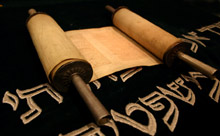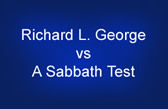

Argument V
Abusing Levitical Privilege


Throughout his letter, Mr. George defends the practice of dining out on the Sabbath by claiming that God accepts practices that would normally be wrong if the attitude behind it is honorable. In other words if one's intentions are good, God will look past the sin being committed. This, by the way, is an argument that is used prolifically by Protestants in defense of a host of practices they embrace.
The core of Mr. George’s argument is that if the Levites can engage in profane labor on the Sabbath with God’s blessing, then he (Mr. George) may go out into spiritual Egypt where the Sabbath is being desecrated and purchase the services of those who are also profaning this day. In essense, Mr. George makes no distinction between these two behaviors because they are both motivated by a heart that wants to honor God.
Mr. George:
Christ's plain statement in Matt. 12:5 that "priests profane the Sabbath blamelessly" shows what's done in furtherance of Sabbath observance does not receive the condemnation which would apply to the same behavior done as a rejection of the Sabbath. Those priests maintained fire, slaughtered animals, lifted heavy carcases, etc. Now, that's work! The worshiper's intent surely does matter.
Our Response:
Mr. George makes three significant mistakes in his characterization of the Levites Jesus spoke of. First, it was not their attitude that earned them God’s dispensation for working on the Sabbath. It was the nature of their labor.
The Levites were specifically set apart by God to serve as special guardians of the tabernacle (Num. 1:51; 18:22-24). Additionally, because they were totally consecrated to the service of God, the rules pertaining to them were different. For example, they had no territorial possessions. God was their inheritance (Num. 18:20; 26:62; Deut. 10:9; 18:1, 2), and for their support it was ordained that they should receive from the other tribes the tithes of the produce of the land.
It was the duty of the Levites to move the tabernacle when the Israelites broke camp in the wilderness. Additionally, they were to serve the priests at the sanctuary services (Num. 8:19; 18:2-6). We offer this brief description because Mr. George will shortly argue that because these servants labored for God and His people, he (Mr. George) may now seek out the labor of restaurant personnel and purchase it for himself and his brethren. What he fails to admit is that one behavior is specifically commanded by God whlie the other is well, you know.
The second error Mr. George advances is in his logic. According to his reasoning, because LEVITES were held blameless for working in furtherance of the Sabbath, he should also be held blameless for paying unbelievers who labor for him, because it aids him in the furtherance of his Sabbath observance. Human reasoning? We think so. Regardless of how Mr. George wishes to take this argument, it will inevitability lead to a dead end. Why? Because neither Mr. George or the laborers in the restaurant are Levites. Therefore, he can't claim dispensation for either one of them. It is God who gives it, and He clearly doesn't give it here.
The third error is in his description of the labor performed by Levites on the Sabbath. He implies that that on the seventh day great amounts of work were done by them in God’s service. Mr. George claims that on this day the Levites maintained fires, slaughtered animals, and lifted heavy carcasses etc. He then punctuates his point by saying, “Now, that's work!”
However, the truth is quite different from that which Mr. George describes. Contrary to what he asserts, labor performed by the priests was significally less on the Sabbath than on other days. This is because the only sacrifices made on that day were directed by God. The common people never brought sacrifices on the weekly Sabbath, despite what Mr. George claims. For more information on this particular argument see MIllennial Restaurants.
The truth is that the only instructions given in Scripture for the celebration of the Sabbath in the sanctuary are those which enjoin 'a holy convocation,' or a sacred assembly (Lev 23:3); the weekly renewal of the shewbread (Lev 24:8; Num 4:7); and an additional burnt-offering of two lambs, with the appropriate meat and drink-offerings, 'beside the continual' (that is, the ordinary daily) 'burnt-offering and drink-offering' (Num 28:9,10). That's it! Nothing more. No one was sweating over huge meals as Mr. George implies.
Mr. George continues:
Once again Mr. George can't resist the urge to blur the lines between legitimate levitical duties and ungodly Sabbath behavior. He employs this "bait and switch" approach to his argument by first identifying several appropriate functions performed by God's people every Sabbath and then subtling linking them to practices that have absolutely nothing to do with the conducting of services. Human reasoning? We think so.
With respect to renting halls for the Sabbath we offer Mr. George some honesty he simply ignores in his argument. Here it is.
Dear Mr. George,
Although you fail to admit it, there is a HUGE difference between renting a hall for services and going to a restaurant on the Sabbath. The halls which are rented by COGs around the world are specifically dedicated to the service of God's people and their worship of Him. Furthermore, God's people don't seek out halls on the Sabbath and negotiate rents. They also don't sign leases or give deposits on the Sabbath. Even you have the sense to know that to do so would be engaging in business (Neh. 10:31).
Additionally, although some halls require their personnel to be there, it is not a requirement of the Church. In other words, the Church does not need facility staff in order to conduct services. In essence, such personnel provide NO SERVICE whatsoever to God's people. They are simply protecting the interests of those who own or manage the hall. In truth, the Church is renting space, not manpower.
When it comes to dining out on the Sabbath this is not the case. In truth, the personnel working at a restaurant are absolutely essential to what you are advocating. Labor is what is being contracted. In other words, there must be people there to prepare and serve the food as well as a host of other functions.
If you genuinely believe what you are arguing in this point here are some questions for you: What would happen if the halls you use for services gave you the option of not having any of their people present? Would your services be able to go on without them? The answer should be obvious—of course they would! Now let's suppose that the restaurant you go to on the Sabbath gave you the option of not having anyone serve you or prepare your meals on the Sabbath.
Do you see the difference now?
Blow the Trumpet
Finally, Mr. George claims that Jesus' own example vindicates those who dine out on the Sabbath. This is because the Messiah dined out on the Sabbath too. This is true. However, He didn't go to an inn or restaurant, He went to a private home. We at Blow the Trumpet think that's a little different. Furthermore, if Mr. George wants to follow Jesus' example of dining at the homes of brethren he may do so with God's full blessing--ours too for that matter.
Note from Blow the Trumpet
There are some who argue that because restaurant personnel are serving God's people on the Sabbath, they are actually performing a Levitical duty and are thus held blameless. They do this by once again bluring the lines between the holy and the profane. For those who hold to this view, we offer some clarification regarding some distinctions between Levites and restaurant workers.
- Those who perform Levitical duties serve the God of Heaven in accordance with His law. Those who work in restaurants on the Sabbath serve the god of this world (2 Cor.4:4) according to his law.
- The Levites are committed to assisting God’s people in honoring His Sabbath and holy days. Those who work in restaurants have no idea what those days are let alone what they mean. They will however, wish you a “Merry Christmas” or a “Happy Easter.”
- Any compensation extended to those performing Levitical duties is provided by God Almighty from tithes and offerings given to Him. Meanwhile, those who work in restaurants are compensated by patrons in the form of tips and by their employer who generates revenue by selling products.
- Those who perform Levitical duties on the Sabbath are held blameless before God. However, those who work in restaurants on the Sabbath are commanded to REPENT!
A Note to Richard George
There was a time when God did NOT hold the priests blameless for their service. This is when they sought to do their own will and not the will of God. At that time they did violence to the law, by wresting it to wrong ends. They put no difference between the holy and profane. They made no distinction between the Sabbath and other days, sanctioning violations of that holy day. "Holy" means, what is dedicated to God; "profane" means, what is in common use. Thus God said " I am profaned among them." They abuse My name to false or unjust purposes.
Ezekiel 22:26
"Her priests have violated my law, and have profaned mine holy things: they have put no difference between the holy and profane, neither have they shewed difference between the unclean and the clean, and have hid their eyes from my sabbaths, and I am profaned among them."
Argument VI